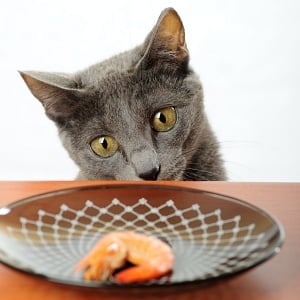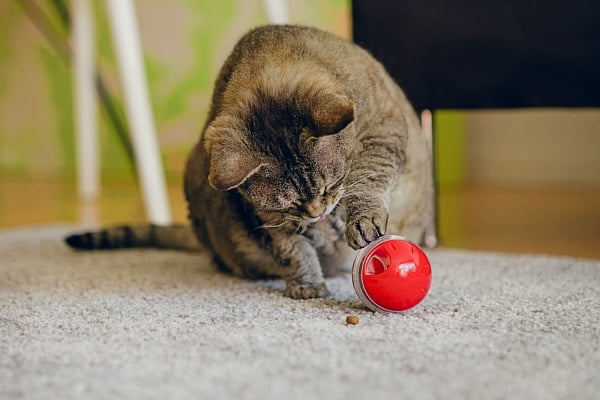Does it seem like your cat wants to eat all the time? It doesn’t matter to them when you last fed them. Does it seem like your cat wants food all the time? Do you have a food obsessed cat? In this article, you’ll learn why your cat may be hungry all the time, how many meals you should feed them, and what to do if your cat is obsessed with food.

Table of Contents
Is your cat always hungry?
If you are wondering “all my cat wants to do is eat? you are not alone. Your cat’s appetite being high is a common eating problem. Another way to say this is having a cat that is food obsessed can be “a feature” of cats. In this article, we are going to discuss possible causes and solutions for addressing increased appetite in cats (also known as polyphagia). There are reasons that your hungry cat wants to eat all the time.
Remember, polyphagia itself is not a disease. It’s a symptom of either a behavioral or medical issue. To resolve these issues as a responsible cat owner, you must find the source.
Why is my cat hungry all the time?
First, please have your veterinarian give your cat thorough physical exam. Pay attention to their body weight and how it changes. This is more important in a older cat than a kitten. Let your veterinarian know as much details about your cat’s increased appetite. For example if your cat eats plastic bags or other non-food items, this is a condition known as feline pica. Make sure to talk to your veterinarian about that. By tracking your cat’s appetite and how much cat food they are eating, your veterinarian can better rule out medical problems.
Common medical reasons that may explain why your cat is wants to eat all the time are worms (parasite), diabetes mellitus , hyperthyroidism (overactive thyroid), a tumor, insulin shock, a metabolic disorder, and many others. It is very troubling when a cat is eating their canned food, but skinny or worse, experiencing weight loss . If your food obsessed cat eats all the time but doesn’t experience weight gain, this is something to look into further. For example this could be a sign of intestinal parasites (worms etc.)
Most veterinary handbooks list about 10 to 20 health conditions that may result in polyphagia. Conditions like hyperthyroidism and intestinal parasites are common. A kitten and a lactating female cat might also have an increased appetite which is normal. If your veterinarian diagnoses your cat with a parasite or other disease (gastrointestinal tract issue for example) you should follow their recommended treatment. In many cases, treating the disease is what it takes to stop your cat from constantly wanting food. But what if your older cat or kitten is fine and healthy after their veterinary exam?
How many meals should your cat eat each day?
After you know there is nothing wrong with your adult cat or kitten medically, there are two more possible concerns to address.
If your cat’s appetite remains high, ask these questions:
- Is your cat getting enough food daily (e.g. wet cat food) ?
- Are your cat’s meals spaced evenly apart through the day?
First, take a look at the label on the cat food label (dry food, wet food, or canned food). Find the correct amount to give your cat daily according to their weight (their healthy weight that is). Divide this amount into three to four meals and make sure you give them on a regular schedule. This is how cat’s eat in the wild, hunting their prey and then consuming their meal.
As a concerned cat owner, know that your cat will appreciate a consistent feeding routine. Setting reminders on your phone will make meal times easier to hit. Feed your cat several meals per day at the same time. Avoid giving them a snack as you are training them their meal schedule as this will mess with their training. Also make sure they don’t get into dog food if you have them.
By following a schedule, it gives predictability for your cat. This means that if feeding times come at a set time, there is no reason for them to beg for it before then. Of course, your cat might meow and bug you as meal time approaches (which is normal). If you are consistent about their feeding times, their begging habit will soon stop. As a cat feeds throughout the day in the wild, filling your cats food bowl with at least three meals a day mimics their natural instincts. It also helps regulate their blood sugar levels.
If you have been “open” feeding your cat (always having a full food dish out), you have unintentionally taught your hungry cat to eat all the time. Regular scheduled meals spread throughout the day will make both your lives more pleasant.
What to do if your cat is obsessed with food
Household cats do not need to hunt for their cat food. I mean it seems like they want to hunt their food bowl, but that’s not really a thing. Your cat’s food is readily available from you. If your household cats do not have something to fill their time, they may start “hunting for food” by purring and meowing at their owners . So what should you do if you have a cat obsessed with food?
Feed your cat through playing. One tried and tested solution is feeding your cat dry food through “Environmental Enrichment”. That’s a long way to say, a “food puzzle”. It is a hollow toy ball with an opening. When filled with cat food, it releases the dry kibble one by one as your cat plays with it. It will make the meal time longer, give them positive reinforcement for playing with it, and will help satiate your cat’s natural hunting instincts.
The following are affiliate links. As an Amazon Associate I earn from qualifying purchases. This is used for keeping the blog up and running smoothly. Please know this does not change the price you see on Amazon. Thank you for your help and support of PET-Happy!
If you don’t have Amazon Prime, we highly recommend trying it. The biggest benefit is free shipping. Yes, free ! You can also get your orders in 1,2, and even same day along with 2 hour grocery delivery. One of our favorites is the free movies and TV shows on Amazon Prime. There are so many more benefits. To find out yourself, you can try Amazon Prime free for 30 days.

Our clients have achieved excellent results, and we ourselves enjoy Catit’s “Treat Ball” and PetSafe’s “Slim Cat” . Other options for you are food puzzles, hide-and-seek games, and, of course, the good old-fashioned “play with your cat for 10 minutes before every meal”-the latter being extremely useful, but not always convenient for cat owners. We found having several of these in our home for our many cats helps keep everyone entertained. Best of all, we found you can clean these in a dishwasher (on the top tray, away from the heating element) makes clean up a breeze.


Of course, you should not forget to provide your cat activity and attention at all the other times. There are many benefits of regular playing , petting, or even talking to your cat.
Important tip: There is no rule as to how much you should play with your cat. But there is a rule that the more activity your cat gets, the less he will beg for food. Besides, playing is undoubtedly not the only activity available for your cat. See here for other activities for cats .
Don’t reward your cat’s begging for food
It is likely that the most annoying thing you find about your cat begging for food is their meowing, purring, and walking beside you all day long.
We strongly recommend you ignore you ignore your cat’s bad habit of begging for a snack.
Your cat may have developed their begging habit because they know you’ll reward this behavior for food or your attention. We’re not even talking about not feeding your cat when they meows for food or preventing your cat from stealing food in between meals.
Even shooing your cat away or petting them will only reward this behavior and give them a glimpse of hope that “My human heard me and knows I want food, so if I insist more…” Don’t let that happen.
Above all, remember that the most important thing if your cat is wants to eat all the time, is your pet’s health. Plenty of underlying health issues are associated with this behavior so you should not take it lightly. If your cat has put on some weight, you can find how to deal with obesity in cats here.
